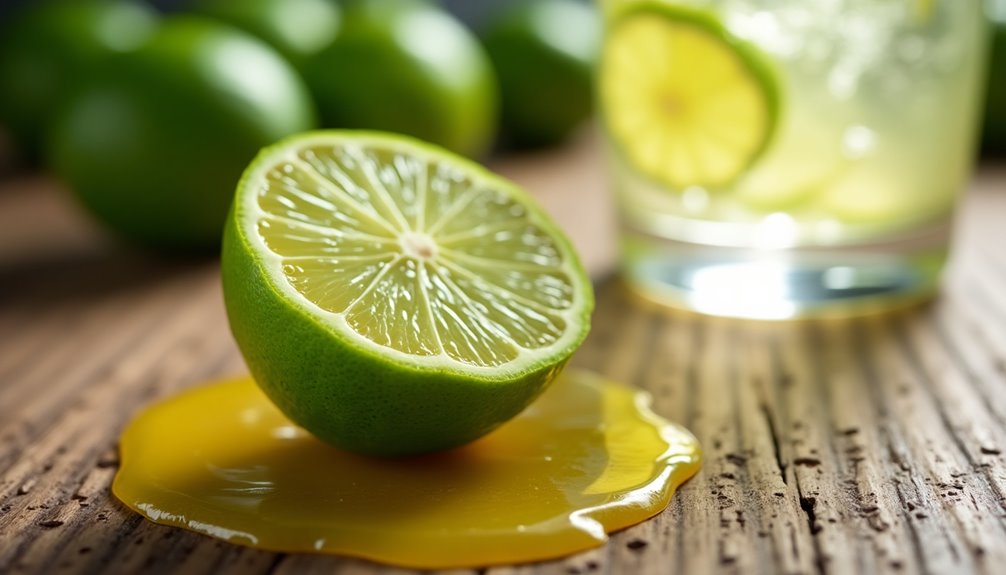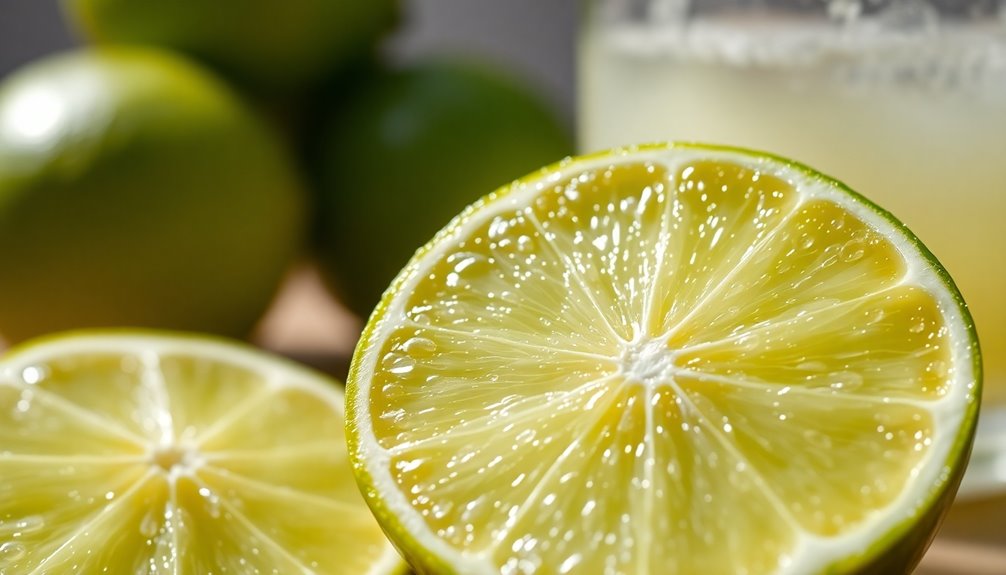Lime juice contains about 7.6 calories per 2-tablespoon serving, which is roughly 3 calories per tablespoon. It's a low-calorie, flavorful option that can enhance your favorite dishes without the extra calories. With no fat or cholesterol, and primarily composed of carbohydrates, lime juice is also rich in vitamin C. You can use it in cocktails, dressings, and marinades. There's a lot more to discover about its benefits and culinary uses!
Key Takeaways
- Lime juice contains approximately 7.6 calories per typical serving of 2 tablespoons (30 grams).
- Each tablespoon of lime juice has about 3 calories, making it a low-calorie option.
- The majority of lime juice's caloric content comes from carbohydrates, accounting for about 90%.
- Lime juice is fat-free and cholesterol-free, making it a healthy addition to meals.
- With around 21 calories per 100 grams, lime juice allows for generous use without adding significant calories.

Ever wondered how many calories are in lime juice? If you're looking for a way to add a zesty kick to your meals without piling on the calories, lime juice is a fantastic option. In fact, a typical serving of lime juice—about 2 tablespoons, or 30 grams—contains only approximately 7.6 calories. That's just 3 calories per tablespoon, making it a low-calorie choice that you can easily incorporate into your daily diet.
When you think about flavor enhancement, lime juice stands out as a powerful ingredient. Its bright, tangy flavor can elevate everything from salads to marinades without significantly affecting your caloric intake. With lime juice, you can enjoy delicious dishes while keeping your calories in check. Since it's low in calories, you don't have to worry about compromising your health goals. Instead, you can focus on enjoying the vibrant taste it brings.
You might be curious about where those few calories come from. Well, the majority of calories in lime juice come from carbohydrates, which account for about 90% of its caloric content. Fortunately, these carbohydrates aren't harmful; they're simply part of the natural composition of lime juice.
Plus, lime juice contains no fat or cholesterol, reinforcing its status as a healthy flavoring choice. If you're keen on maintaining a balanced diet, lime juice is a nutrient-rich option that won't derail your efforts.
Lime juice is also an excellent source of vitamin C, which plays a crucial role in supporting your immune system and overall health. By adding lime juice to your diet, you're not only enhancing the flavor of your meals but also boosting your nutrient intake. Whether you squeeze some over fish, use it in salad dressings, or mix it into beverages, you're giving your body a dose of this essential vitamin.
Incorporating lime juice into your daily diet is simple and versatile. You can use it in a variety of dishes and drinks, from refreshing limeade to savory tacos. The possibilities are endless, and the low-calorie count means you can enjoy it guilt-free.
Plus, with its low caloric density—only about 21 calories per 100 grams—you can use more lime juice for added flavor without worrying about extra calories.
Frequently Asked Questions
How Many Calories Are in a Lime Juice?
When you're curious about the caloric content of lime juice, you'll find it surprisingly low.
A typical serving, which is about 2 tablespoons, has roughly 7. 6 calories. If you’re looking to add flavor to your dishes or drinks without adding too many calories, lime juice is a great choice. It’s versatile and can be used in a variety of recipes, from marinades to cocktails, enhancing both taste and freshness. Additionally, if you’re comparing options, it’s worth noting the caloric content of grape juice, which is significantly higher, making lime juice a better choice for those watching their caloric intake. Incorporating lime juice into your meals is an easy way to keep flavors vibrant while keeping calories low.
It's primarily carbohydrates, so you can enjoy the tangy taste without worrying much about your calorie intake. It's a win-win!
Is Lime Juice Good for a Diet?
Imagine a tiny burst of sunshine in your drink—lime juice is just that!
It's great for a diet since it's low in calories and packed with vitamin C. You can splash it in your meals guilt-free, adding flavor without the extra weight.
Plus, its antioxidants fight inflammation, supporting your overall wellness.
How Many Calories Are in a Splash of Lime Juice?
When you're considering a splash of lime juice, you're looking at around 3 calories for about 1 tablespoon.
This low-calorie option makes it a great addition to your meals or drinks without adding significant calories. If you use 2 tablespoons, that jumps to roughly 7.6 calories.
Its minimal caloric contribution allows you to enjoy the zesty flavor while keeping your diet in check, making it a smart choice for flavor enhancement.
How Many Calories Are in 2 Tablespoons of Freshly Squeezed Lemon Juice?
Imagine sipping on a refreshing potion that adds zest to your dish without the guilt.
When you use 2 tablespoons of freshly squeezed lemon juice, you're only adding about 7.6 calories to your meal. It's a fantastic way to enhance flavor without piling on the calories.
With minimal sugars and mostly carbohydrates, lemon juice keeps your meals light and bright, making it a perfect addition to drinks, marinades, and dressings.
Conclusion
In conclusion, lime juice is a low-calorie addition to your meals and drinks, with just about 11 calories per ounce. That means you can splash it on your tacos or mix it into cocktails without worrying about packing on the pounds! Plus, it's packed with vitamin C, which can boost your immune system. So, go ahead and enjoy that zesty flavor guilt-free—it's a delicious way to enhance your dishes while keeping calories in check!
Cindy thoroughly researches juicing trends, techniques, and recipes to provide readers with practical advice and inspiration. Her writing style is accessible, engaging, and designed to make complex concepts easy to understand. Cindy’s dedication to promoting the advantages of juicing shines through her work, empowering readers to make positive changes in their lives through the simple act of juicing.
















